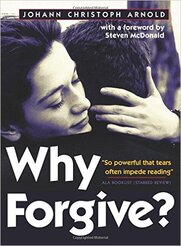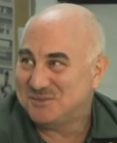For if ye forgive men their trespasses, your
heavenly Father will also forgive you. But if
ye forgive not men their trespasses, neither
will your Father forgive your trespasses.
Matthew 6:14-15
I have just finished reading a book titled, WHY FORGIVE?, by Johann Christoph Arnold...
heavenly Father will also forgive you. But if
ye forgive not men their trespasses, neither
will your Father forgive your trespasses.
Matthew 6:14-15
I have just finished reading a book titled, WHY FORGIVE?, by Johann Christoph Arnold...
|
Interestingly, the book's forward was written by a now wheelchair-bound New York City police detective by the name of Steven D. McDonald. A police officer at the time, while on routine patrol in July 1986, Officer McDonald took a bullet in the back which left him paralyzed. The perpetrator was later captured and sent to prison.
The book's title, "Why Forgive?" says a lot. Why forgive? Although it may seem like an impossible thing to fully forgive someone who has hurt you, I believe that by the grace of God, it can be done. I say this because the Lord would not ask His children to do something that cannot be done. In fact, Christ commands His disciples to do this. It is His will that we forgive others for any wrongs done to us. |
Furthermore, forgiveness is good for one's soul. WHY FORGIVE is a collection of stories of people who have been hurt in horrendous ways. Yet at some point in each of their lives, they've made the conscious yet exceedingly difficult decision to forgive their offenders.
According to their individual accounts, forgiving was a process. It didn't happen overnight. Neither was it done without, lots of help and encouragement from family, friends, and in some cases, ministers. There was much soul-searching, too. Yes, those who had been devastated by the cruel acts of others said it was the "most difficult" decision of their lives. But once it was done, only then could the process of healing begin.
The results of forgiving the offender would lead each victim on a long journey to peace of mind as well as the gradual release of deep-seated anger and bitterness, which, as they all confessed, was slowly destroying them physically and emotionally. To remain in a state of unforgiveness was, by their own admissions, only making things worse.
None experienced instantaneous healing, however. But by choosing to forgive their offender, each was able to begin moving forward, albeit slowly, towards wellness and wholeness. Some even went on to meet with their offenders. Several even became friends with them. Quite amazing!
Forgiveness is a compelling force. It can change lives for the better. It can even change the world.
D.B.
"Why Forgive?" by Johann Christoph Arnold, Orbis Books, Maryknoll, NY c.2000
According to their individual accounts, forgiving was a process. It didn't happen overnight. Neither was it done without, lots of help and encouragement from family, friends, and in some cases, ministers. There was much soul-searching, too. Yes, those who had been devastated by the cruel acts of others said it was the "most difficult" decision of their lives. But once it was done, only then could the process of healing begin.
The results of forgiving the offender would lead each victim on a long journey to peace of mind as well as the gradual release of deep-seated anger and bitterness, which, as they all confessed, was slowly destroying them physically and emotionally. To remain in a state of unforgiveness was, by their own admissions, only making things worse.
None experienced instantaneous healing, however. But by choosing to forgive their offender, each was able to begin moving forward, albeit slowly, towards wellness and wholeness. Some even went on to meet with their offenders. Several even became friends with them. Quite amazing!
Forgiveness is a compelling force. It can change lives for the better. It can even change the world.
D.B.
"Why Forgive?" by Johann Christoph Arnold, Orbis Books, Maryknoll, NY c.2000


 RSS Feed
RSS Feed